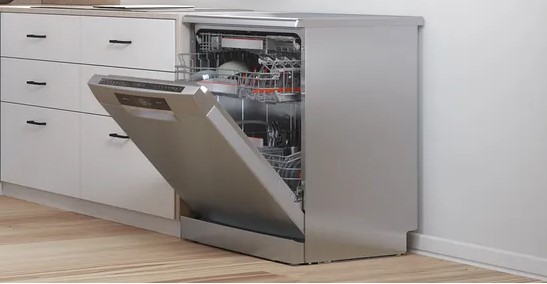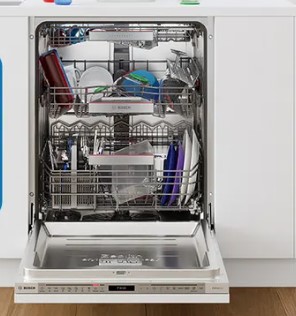The drain pump is an essential part of the dishwasher, and that’s why you should check it when your Bosch dishwasher has draining issues. Fortunately, the Bosch dishwasher drain pump test is pretty straightforward, and I’ll show you how to do it.
Generally, you can test the Bosch dishwasher pump with a multimeter. Just probe the multimeter into the dishwasher pump motor to test its continuity or resistance level. The lack of continuity or a resistance level above 200 ohms indicates a bad drain pump.
And if the drain pump is defective, you’ll need to replace it. But before you do, you must ensure it’s not clogged, as excessive clogging could stop it from working as it should.
This guide will help you test the dishwasher drain pump with a multimeter and replace it if you find it faulty. But first, let’s look at when you may consider testing your Bosch dishwasher drain pump.
Here we go!

When Is the Bosch Dishwasher Drain Pump Test Necessary?
The drain pump test may be a good idea if you notice these issues with your Bosch dishwasher:
- Slow drainage – If your dishwasher starts to drain slowly, there is a chance that the drain pump could be failing. The issues could be as simple as clogging or the pump becoming defective and needing a replacement.
- No drainage – Once the drain pump fails, the dishwasher won’t drain. So, while there could be other issues that I’ll highlight later, a failed drain pump may be one of the most likely ones.
- Water leakage – If water leaks onto the floor, that could result from a failed drain pump. In that case, the drain pump fails to pump out water, causing some of it to leak onto the floor.
- Standing water – If water stands in the tub and won’t go out after pumping, there is a chance that the drain pump is defective.
- Noise – Sometimes, the dishwasher makes a low-noise squeal or humming sound to show that the drain pump is struggling to run. The noise indicates that you should check the drain pump for fault.
How to Test Bosch Dishwasher Drain Pump with Multimeter?
Now that you know when to test your Bosch dishwasher drain pump, let’s see how. Generally, you can determine if your Bosch dishwasher drain pump is faulty using a multimeter, and here’s how to do it:
Step 1 – Uncover the drain pump
Remove the retaining cap from the sprayer arms, impeller, O-ring, and flat plate. Then remove the components covering the pump, such as the screen.
Step 2 – Set the multimeter appropriately
Set the multimeter on the ohm setting to measure the drain pump’s resistance or continuity if you want to check its electrical path.
Step 3 – Probe the multimeter into the drain pump motor
Identify the motor part of the pump and probe the multimeter into it. That allows you to determine its continuity or resistance.
Step 4 – Check out the reading
Check out the values on the multimeter. If the drain pump motor lacks continuity, that proves it’s defective. But if you opt for resistance, the best range is 0-100 ohms. It’s, however, acceptable up to 200, but once the resistance exceeds 200 ohms, you should replace the drain pump.

Bosch Dishwasher Drain Pump Clogged
The dishwasher drain pump shouldn’t be clogged. If it is, then there is the chance that it won’t pump out water, and even if it does, the dishwasher will drain slowly. However, clogging is avoidable by regularly cleaning the dishwasher to eliminate possible food debris.
Remember, the other risk of a clogged drain pump is that it may fail in the long run, and you may need to replace it, which can be expensive.
Bosch Dishwasher Drain Pump Replacement
If your Bosch dishwasher drain pump is defective, the only fix is to replace it, and here’s how to do it:
- Turn off the dishwasher, unplug it, and move it away from the wall
- Unscrew the top panel, side panels, and front part
- Detach the kick strip and unscrew the cover plate
- Disconnect the water-detection sensor
- Detach the old drain pump by turning it anticlockwise
- Fit in the replacement drain pump
- Return everything as it was
- Restart the washer
Bosch Dishwasher Troubleshooting Not Draining
Is your Bosch dishwasher not draining at end of cycle? While a failed drain pump should be one of the considerations, it could be something else. Generally, here are the things to check and troubleshoot when your Bosch dishwasher won’t drain:
- Clogging – If the dishwasher is clogged, which may happen over time, water won’t drain out. In most cases, the affected parts are the drain pump, filter, garbage disposal, air gap, and drain valve. If any of these parts are dirt-clogged, you should try to clean them.
- Excess foam – Your dishwasher may have difficulty draining if there is too much suds formation. The extra foam could result from using too much or the wrong detergent.
- Hose kinking – If the drain hose is kinked, it’ll restrict drainage. If so, you should straighten it out to allow water to drain smoothly.
- Damaged drain impeller – The dishwasher may also have difficulty draining water if the drain impeller is damaged. Thus, you should inspect and replace it if that’s the case.
- Faulty drain pump – If the drain pump itself is faulty, which you can tell from the Bosch dishwasher drain pump test described earlier, the dishwasher won’t drain. If so, you should replace the drain pump.

People Also Ask
1. But How Do I Test My Bosch Dishwasher Drain Pump?
The easiest way to test your Bosch dishwasher drain pump is to use a multimeter. Just probe the multimeter into the drain pump motor to determine if the motor has continuity. If it doesn’t, that proves the drain pump is defective.
Alternatively, check out the drain pump motor’s resistance using the multimeter. Ideally, the resistance should be 0-100 ohms, but there is an allowance of up to 200 ohms. However, consider replacing the drain pump if the resistance exceeds 200 ohms.
2. Where Is the Drain Pump On a Bosch Dishwasher?
The drain pump usually is located at the bottom of the Bosch dishwasher, just underneath the spray arms. Its job usually is to pump water out of the spray arms.
3. Can A Dishwasher Drain Pump Get Clogged?
The drain pump can clog with food debris and dirt like most dishwasher parts. When it does, it interferes with the drainage and could stop the dishwasher from draining completely. The issue is, however, avoidable by regularly cleaning the dishwasher.
4. What Is the Most Common Cause for A Dishwasher Not to Drain?
The most typical reason why most dishwashers won’t drain is clogging. If parts like the drain filter, hose, drain valve, and drain pump accumulate food debris and dirt, the clogging can interfere with the drainage.
If the clogging is not excessive, you can clean it off by doing a general dishwasher wash, but if it’s too much, you may need to clean the affected parts individually.
5. How Do I Know If My Dishwasher Drain Pump Is Working?
The easiest way to determine a working dishwasher pump is to test it with a multimeter. Set the multimeter on continuity or resistance settings and then probe it into the drain pump motor.
The drain pump works if the motor shows continuity or has a 0-100 ohms resistance. However, if it lacks continuity and has an electrical resistance above 200 ohms, the pump is faulty and needs a replacement.
6. How Do I Know If My Bosch Dishwasher Drain Pump Is Bad?
You can know if your Bosch dishwasher drain pump is bad if the washer suffers drainage issues. That includes slow drainage and no drainage at all. You can also check signs like standing water and water leakage.
However, the most conclusive way to know if you have a bad drain pump is to use a multimeter. The lack of continuity or a resistance level exceeding 200 ohms confirms a defective drain pump.
7. How Do I Force My Bosch Dishwasher to Drain?
You can force your Bosch dishwasher to drain through a quick reset. Press ‘Start’ for 3-5 seconds or until the dishwasher displays 0:00 or the screen turns off. Once it does, restart the cycle.
But if that doesn’t work, you may have to inspect your drain pump for clogging and clean it before resetting it. And if the drain pump is damaged, replace it.
8. What Causes a Drain Pump to Fail?
The drain pump of a dishwasher may fail due to different reasons. First, it could be due to excessive clogging; if so, you should clean it.
Second, the drain pump could fail from natural wear or physical damage. And third, the dishwasher drain pump may fail if its motor short-circuits, perhaps from a power surge.
9. What Is the Problem with Bosch Dishwasher Not Draining?
There are different reasons why your Bosch dishwasher won’t drain. For starters, it could be that the dishwasher is excessively clogged. In this case, the parts to inspect for clogging include the drain pump, drain filter, air gap, garbage disposer, or drain valve.
If the issue is not clogging, it could be a kinked drain hose, which you should straighten out. If that’s not it, it could be a damaged impeller or excessive suds. If not, the problem could be the drain pump that’s not working and thus needs a replacement.
10. How Do I Fix My Dishwasher Drain Pump?
First, you can fix your dishwasher drain pump by cleaning off dirt clogging to ensure it works seamlessly. If the issue is not clogging, check if the drain pump is damaged and replace it.
Concluding Thoughts on the Bosch Dishwasher Drain Pump Test:
Above is a quick guide to testing your Bosch dishwasher drain pump. As shared, the test is essential when the dishwasher doesn’t drain or does it slowly, when it leaks, and when it makes a low hum or squeal sound.
You only need a multimeter to tell you if the drain pump is defective or working. It won’t have continuity if it’s faulty or its resistance level is above 200 ohms.
On the flip side, if it’s working, it will have continuity, and its resistance level will be about 0-100 ohms. There’s, however, an allowance for a resistance level of up to 200 ohms, but not beyond that.
